2 – Methodology & Operations
Data Collection
EXTRAORDINARY EVENTS
The COVID-19 pandemic impacted research activities including:
Deploying the second BWS survey to experts.
Deploying the primary survey to farmers in-person.
These activities were either modified or cancelled to accommodate for uncertainties around the pandemic in 2020.
BWS SURVEY
During the writing workshop it was agreed that the second BWS survey could be deployed over the phone or via email to experts in July 2020.
The second BWS survey was completed in early 2021.
DEPLOYING PRIMARY SURVEY FOR FARMERS: IN-PERSON
Deploying the primary survey to farmers, in-person, was scheduled for December 2020. All post data collection activities including any possible dissemination was postponed until early 2021.
Secondary data was collected in case primary data collection was not possible due to the pandemic. This compromise allowed the research team to assess existing data through the lens of knowledge transfer, water rights and risk management to provide an action plan, measurement and monitoring protocols to help modify current institutions.
Another option was to shorten the in-person farmer (primary) survey and deploy a phone survey that could capture gender sensitive information that is currently lacking in the secondary data. This could then be combined with the secondary data to provide a better dataset.
The final decision to not deploy the in-person (primary) surveys in December 2020 was made on 30 September 2020.
A pilot survey was created from the primary survey to farmers in-person and was deployed to 50 participants in Bangladesh. The focus of this survey was to knowledge transfer.
COLLABORATION & DISSEMINATION ACTIVITIES
The pandemic also impacted the following activities in the final stages of the research:
In-country dissemination activities.
Project team attending the final project review meeting, in-person
Project team attending the final SDIP program meeting, in-person
BWS survey
BWS EXPERT PANEL MEETINGS
PURPOSE
Deploy the Best Worst Scaling Delphi survey to experts.
BACKGROUND
The first round Delphi was conducted in different ways, depending on setting. It was the view of the research team that the Delphi needed to be nuanced to local conventions.
OUTCOMES
For Bangladesh, it was agreed that the most efficacious approach involved an initial group workshop with experts followed by specific targeted interviews.
In Nepal a survey administered face-to-face was chosen.
In India a combination of phone, email and in-person interviews were selected.
A Delphi workshop was run in Dhaka, Bangladesh, on 12 June 2019. About 20 delegates participated in the Delphi workshop. Not all delegates invited were able to attend. The delegates unable to attend were interviewed, separately, in person.
During the writing workshop it was agreed that the second BWS survey could be deployed over the phone or via email to experts in July 2020.
The second BWS survey was completed in early 2021.
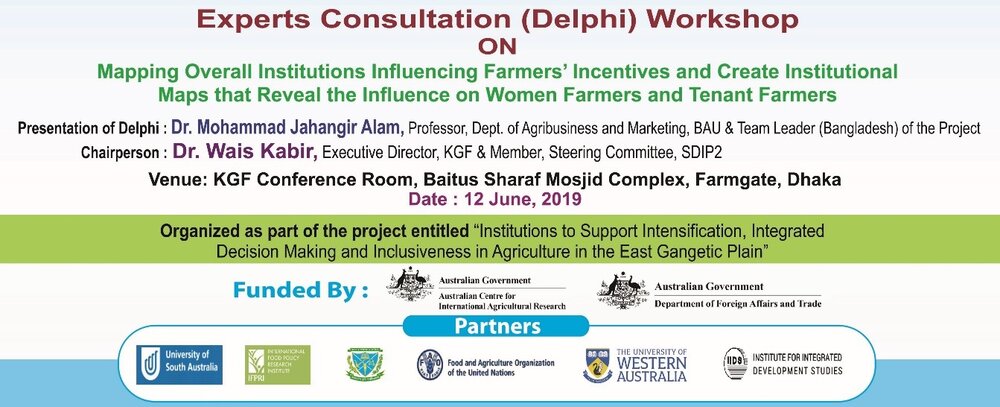
Deploying primary survey for farmers, in-person
Deploying the primary survey to farmers, in-person, was scheduled for December 2020. All post data collection activities including any possible dissemination was postponed until early 2021.
Secondary data was collected in case primary data collection was not possible due to the pandemic. This compromise allowed the research team to assess existing data through the lens of knowledge transfer, water rights and risk management to provide an action plan, measurement and monitoring protocols to help modify current institutions.
Another option was to shorten the in-person farmer (primary) survey and deploy a phone survey that could capture gender sensitive information that is currently lacking in the secondary data. This could then be combined with the secondary data to provide a better dataset.
The final decision to not deploy the in-person farmer (primary) surveys in December 2020 was made on 30 September 2020.
A pilot survey was created from the primary survey to farmers in-person and was deployed to 50 participants in Bangladesh. The focus of this survey was on knowledge transfer.
Collaboration & Dissemination Activities
The pandemic also impacted the following activities in the final stages of the research:
In-country dissemination activities.
Project team attending the final project review meeting, in-person.
Project team attending the final SDIP program meeting, in-person.
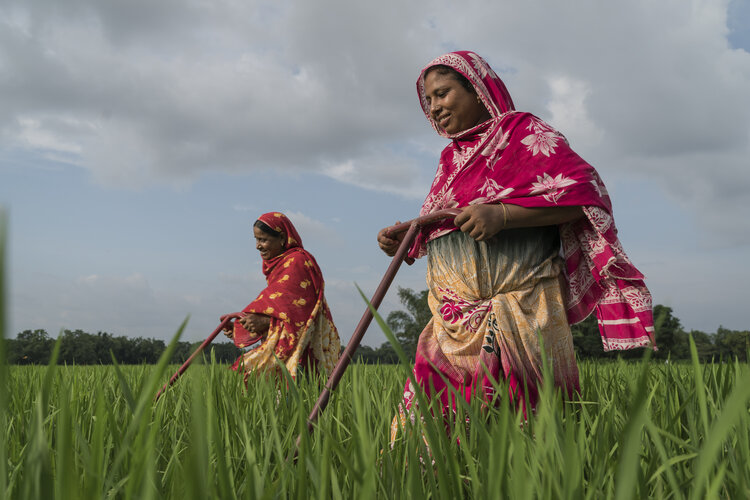

Meetings, Workshops & Field Trips
A series of in-country meetings, workshops and field trips took place at the beginning of the project. In 2020, the research team were unable to meet in-person or get into the field due to the pandemic. The restrictions around movements resulted in a number of activities being run virtually and others cancelled. We have documented all the activities that were held during the project and discussed the modifications to activities below.
Project inception meeting, Nepal, October 2018
PURPOSE
Achieve specific tasks associated with the key outputs of Objective 1 – To create an understanding within agencies of the existing institutions that influence farm-level choices across local and district scales against specific national objectives.
BACKGROUND
The project required the following tasks to be completed:
Form a project steering committee to facilitate access to key decision makers in the region.
Form three sub-steering committees for each domain, knowledge transfer, water rights or risk.
Create a map of the institutional landscape for farmers in the different parts of the EGP.
OUTCOMES
Key personnel were identified for the sub-steering committees and terms of reference (ToR) were drafted.
Participants were divided into three groups, each with some degree of familiarity with a specific domain (knowledge transfer, water rights and risk). Each group undertook a structured set of activities to develop a draft map of institutions.
Each group then shared their map and comparisons between maps were made. An initial ranking exercise was undertaken with the aim of highlighting the most influential institutions at play and to elicit opinions about stand out success and failures.
All the information gathered was used to underpin the Delphi analysis, a systematic means of collecting and collating expert opinion and reaching consensus on complex topics, across a much wider sample on stakeholders.
Each group developed a preliminary list of key informants to assist the Delphi.
Preliminarily ratings for test sites for potential institutional change were made
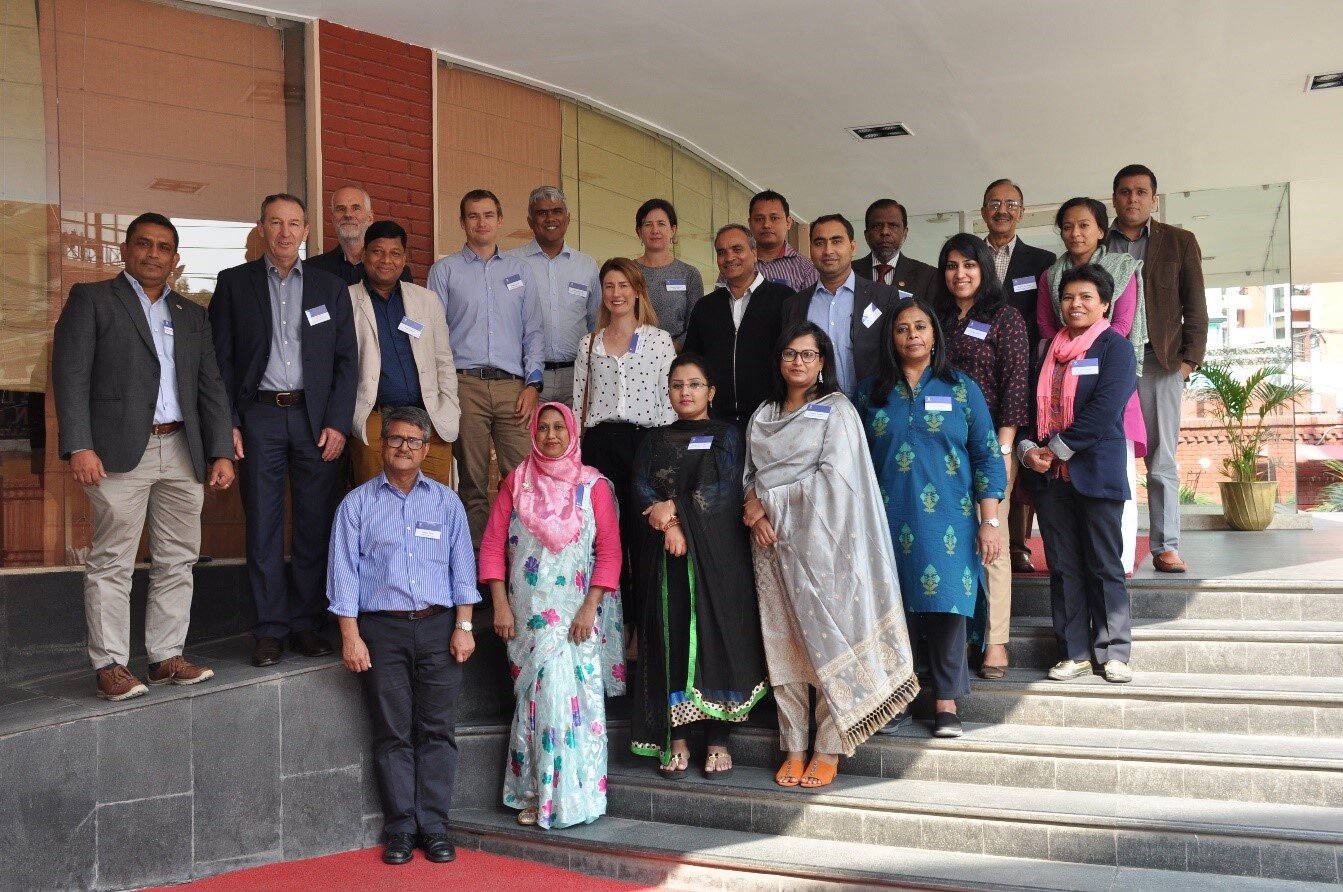
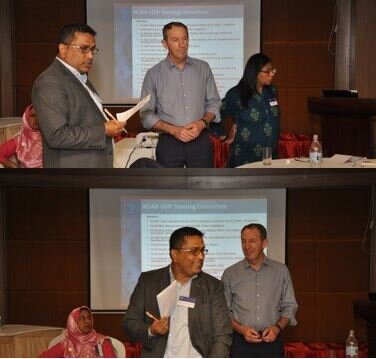
Update and information sharing meeting, Nepal, November 2019
PURPOSE
Review the primary survey format and explore opportunities for refinement prior to deploying the survey.
BACKGROUND
There were six specific items covered during the meeting.
Reiterate the Delphi findings to date and test these with the practitioners of their respective region.
Explore the findings from empirical analysis of secondary data, ground-truth the results and explore nuances informed by local expertise.
Unveil the primary data instruments and seek input on improvements including the specific limitations and caveats that need to be applied.
Collaboratively agree on key directions for the primary analysis and reach consensus on key deliverables that need alignment and timeframes.
Familiarisation with other work being promoted as part of SDIP and leverage as appropriate.
Reach agreement on the test site for an institutional adjustment and designing the randomised controls to make best use of the experiences that relate to Objective 4 of the project.

ACIAR SDIP program meeting, Nepal, November 2019
ACIAR SDIP project leaders requested an annual face to face meeting to explore linkages for a shared understanding about other projects in the program. They were keen to understand future directions if there was a SDIP Phase 3. The ACIAR SDIP program meeting reviewed individual progress; situated outputs within in the wider food system; planned for review and considered options for the remainder of the program and work going forward.

Visiting local farmers
PROJECT MEETINGS IN INDIA WITH FARMERS, SEPTEMBER 2019
In Kolkata, West Bengal, Professor Crase met with farmers in rural areas to discuss aspects of their farming practices and inform them about the project. The information gathered from local farmers helped refine the online survey instrument (primary survey) that was developed in late 2019.
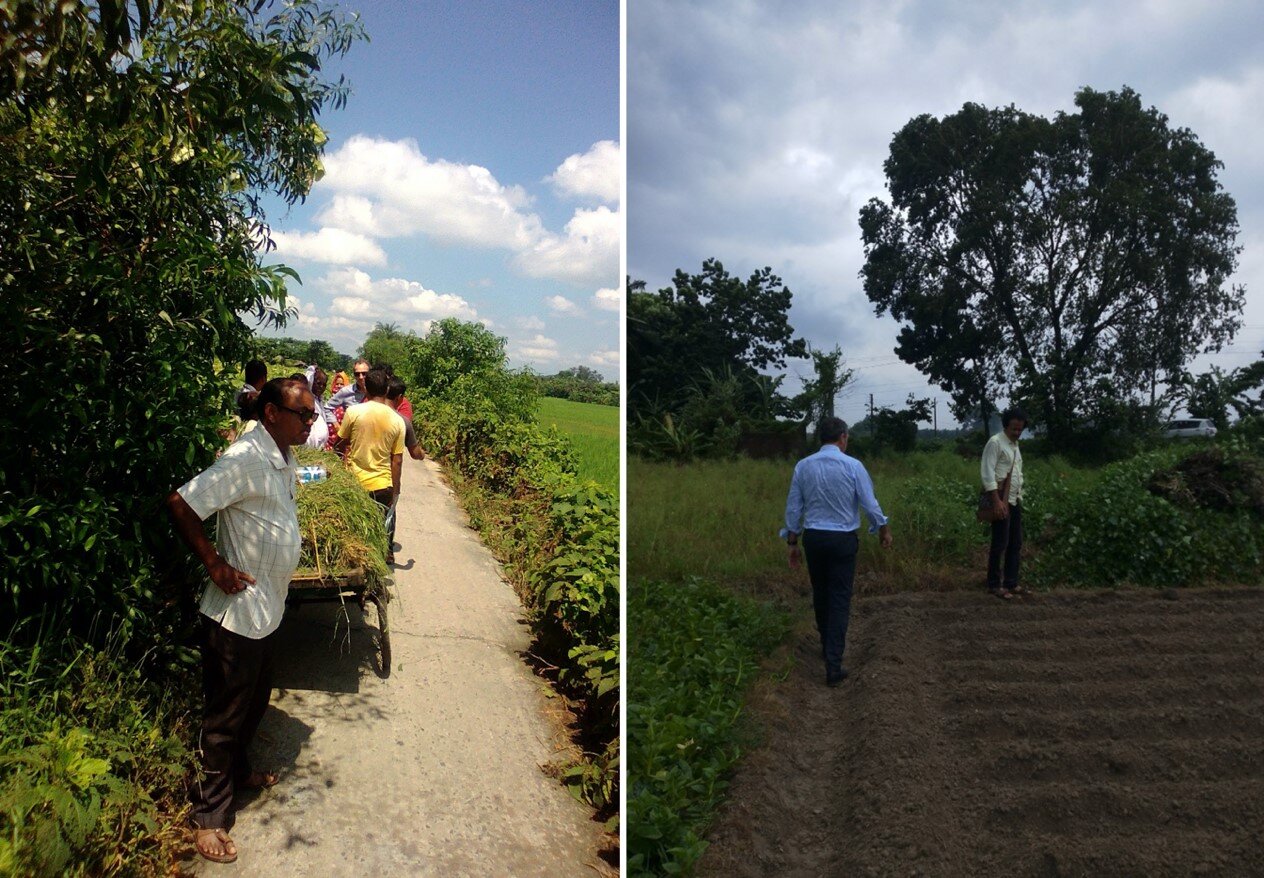
Writing workshop, June 2020
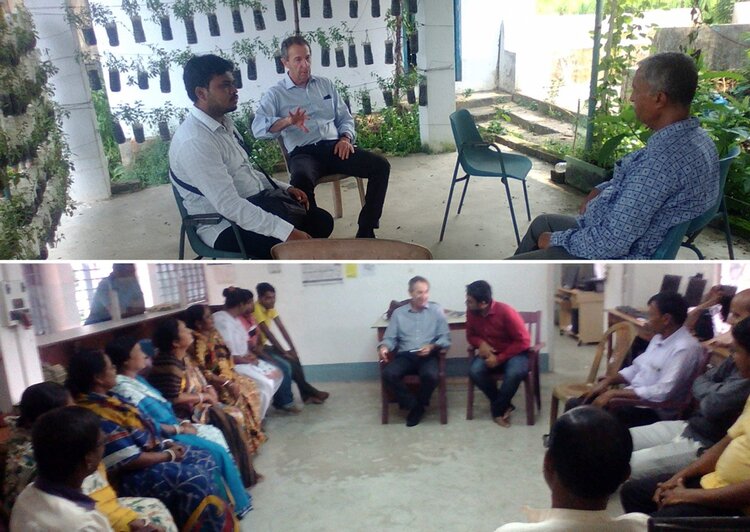
The workshop was held over three days. Two hours on each day of the workshop were held via Zoom between 2pm and 4 pm (ACST). The remainder of each day was set aside for a combination of redrafting and liaising about data and papers via email for the purpose of advancing the production of papers and sourcing secondary data.
Workshop Aim:
Progress all papers that will use secondary data
Map out the structure and arguments for papers that will use primary data.
Workshop Structure:

Papers, drafts and outlines, were circulated prior to workshop for consideration during workshop
Short PowerPoint presentations, of content for papers was shared during workshop, focussed on:
core issues considered in the paper
an explanation of how the paper relates to the project
identifying gaps that need to be filled
suggestions for resources and resourcing.
Pump survey, West Bengal, March 2021
Over 200 pump surveys were carried out over the phone in West Bengal, India. They captured both women and men farmers in the region. The results of this survey were analysed and are in reported in ‘Pumps, policy and alignment to perceived benefits of smallholders in the East Gangetic Plain’.
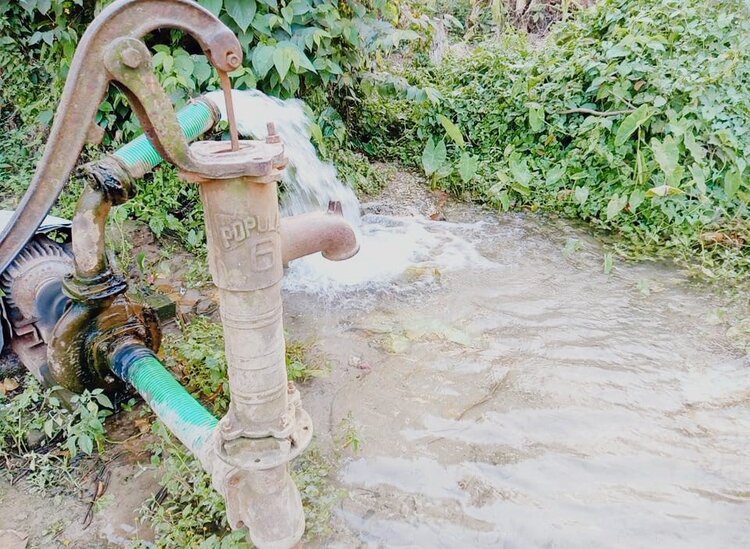

International mini-symposium webinar, virtual, May 2021
International webinar in association with the ACIAR project ‘Institutions to support intensification, integrated decision making and inclusiveness in agriculture in the East Gangetic Plain’
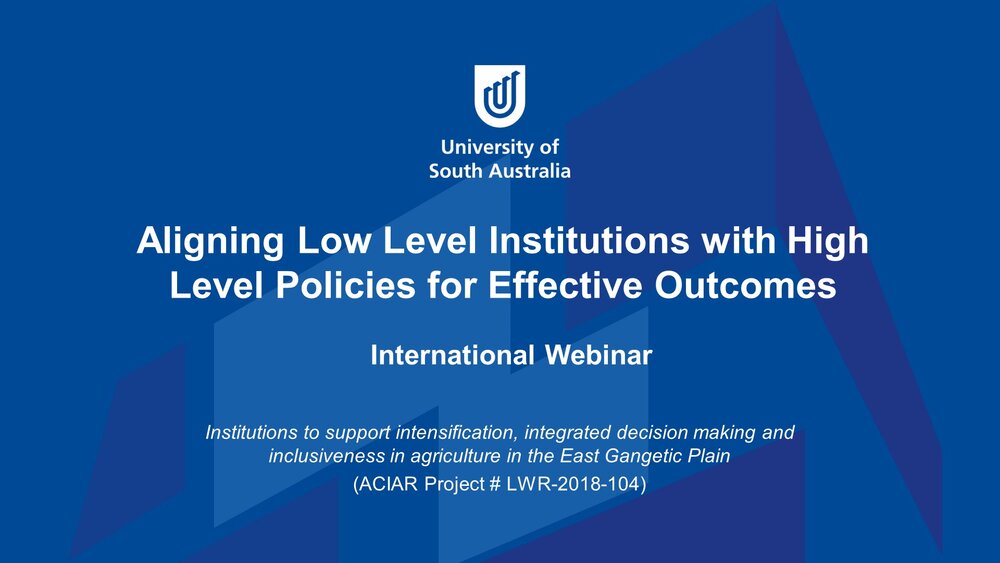
Introductory remarks:
Hon Christopher Pyne ( former Australian Defence Minister)
Invited speakers:
Officials from Bangladesh, India and Nepal
Background: The ACIAR research project focused on institutions across three domains: knowledge transfer; risk management; and water property rights. Information related to inclusion (e.g. gender and tenant farmers) was considered across all three domains, when it was available. This webinar will analyse how the lower level institutions line up with the higher level policies. The outcome of the webinar is to help provide some guidance based on this policy related dialogue and the research findings.
Conferences
AARES CONFERENCE, PERTH, FEBRUARY 2020
Members of the research team attended the AARES conference in Perth. Sophie Lountain, Mahbub Rahman and Professor Crase. Professor Crase presented on behalf of Professor Alam who was unable to attend.
AARES CONFERENCE, VIRTUAL, FEBRUARY 2021
Dr Cooper chaired a mini-symposium, Social inclusion in a development context: Cases from ACIAR projects, at the virtual AARES conference. Three other team members presented at this mini-symposium.
Presentation included:
Sophie Lountain presented on ‘Technology, gender and sustainable livelihoods’.
Mahbub Rahman presented on ‘The effect of high yielding variety on rice yield, household nutrition and poverty reduction: Evidence from rural Bangladesh’.
Dr Kishore presented on ‘Women and Work in Rural South Asia’.